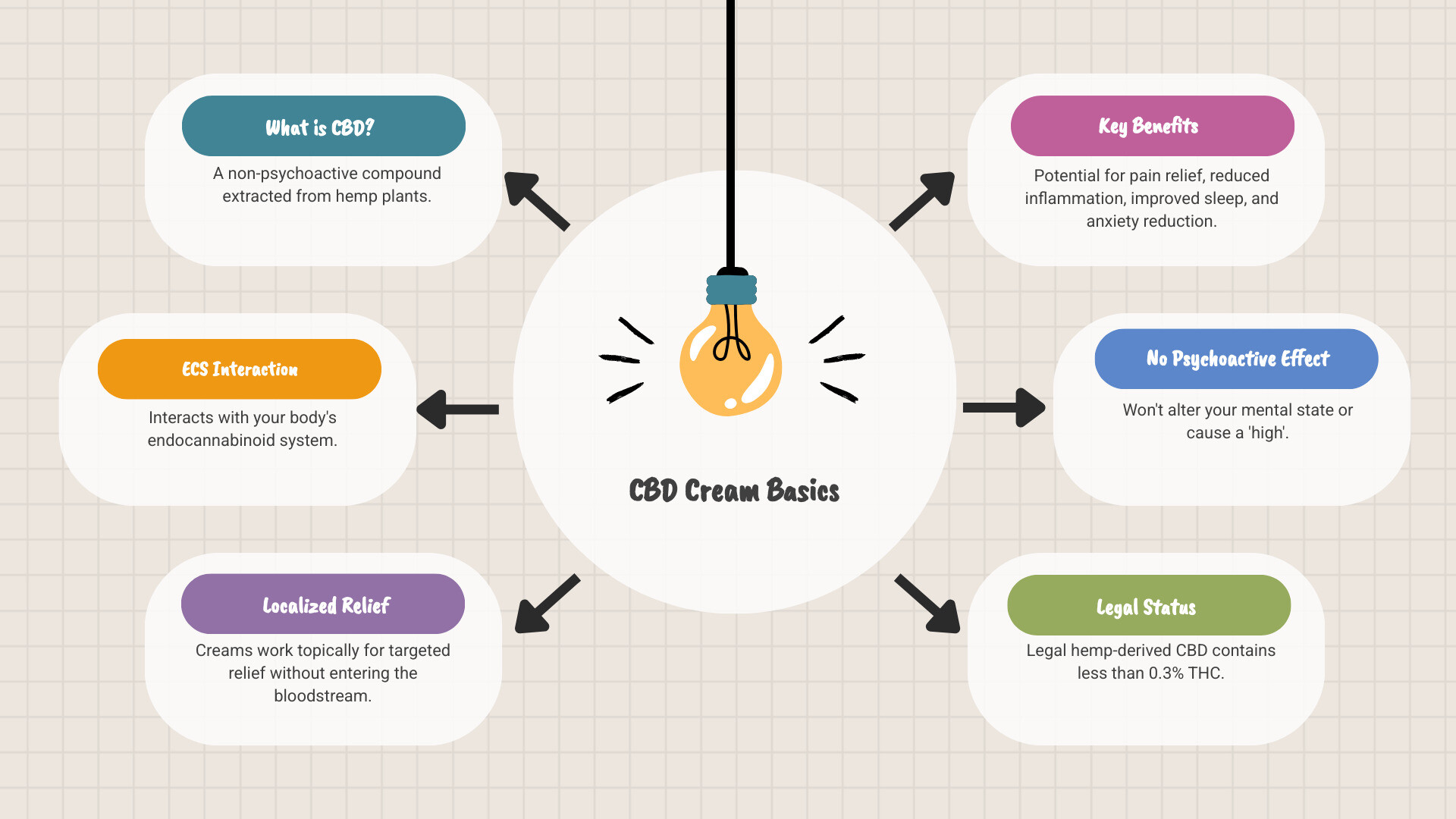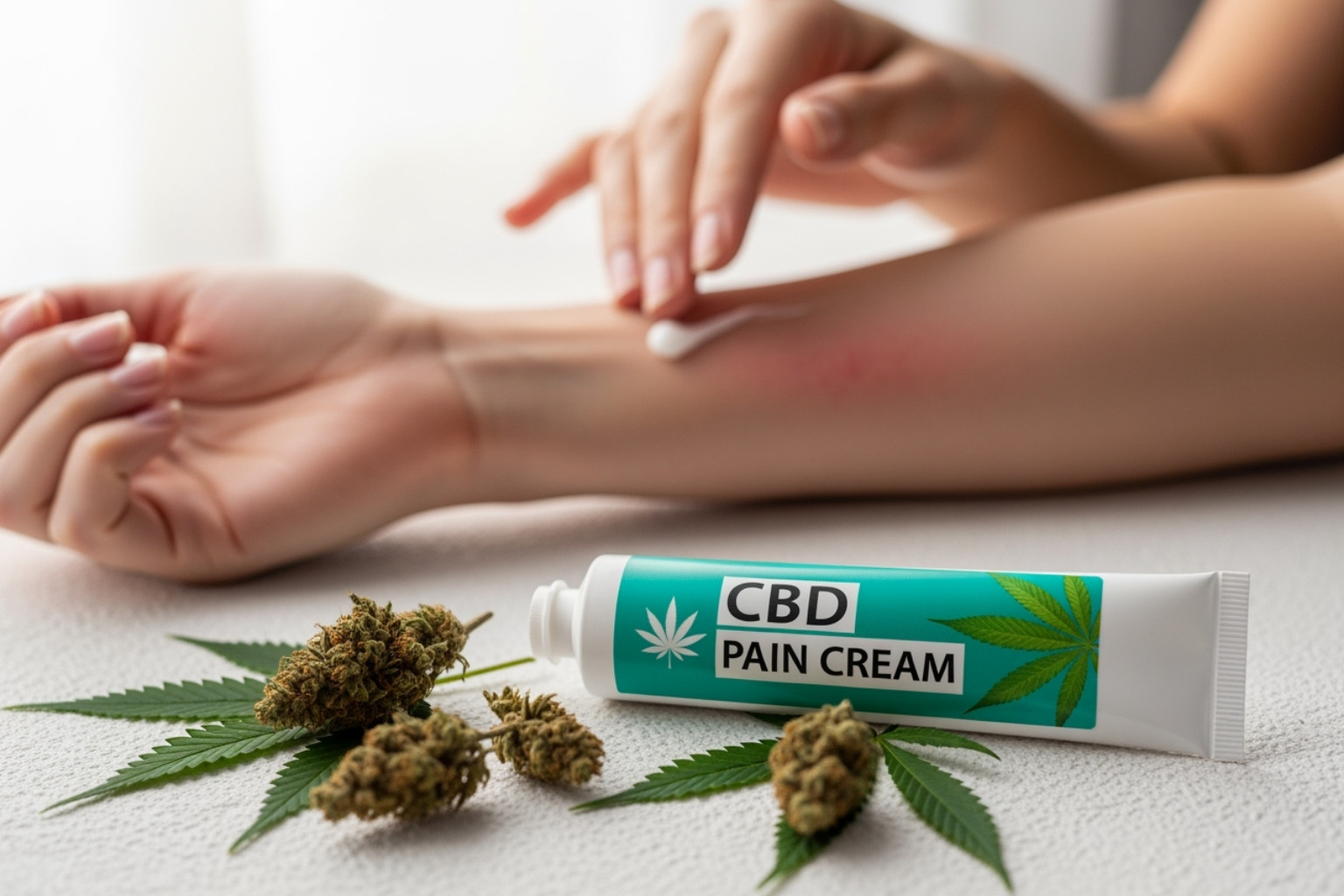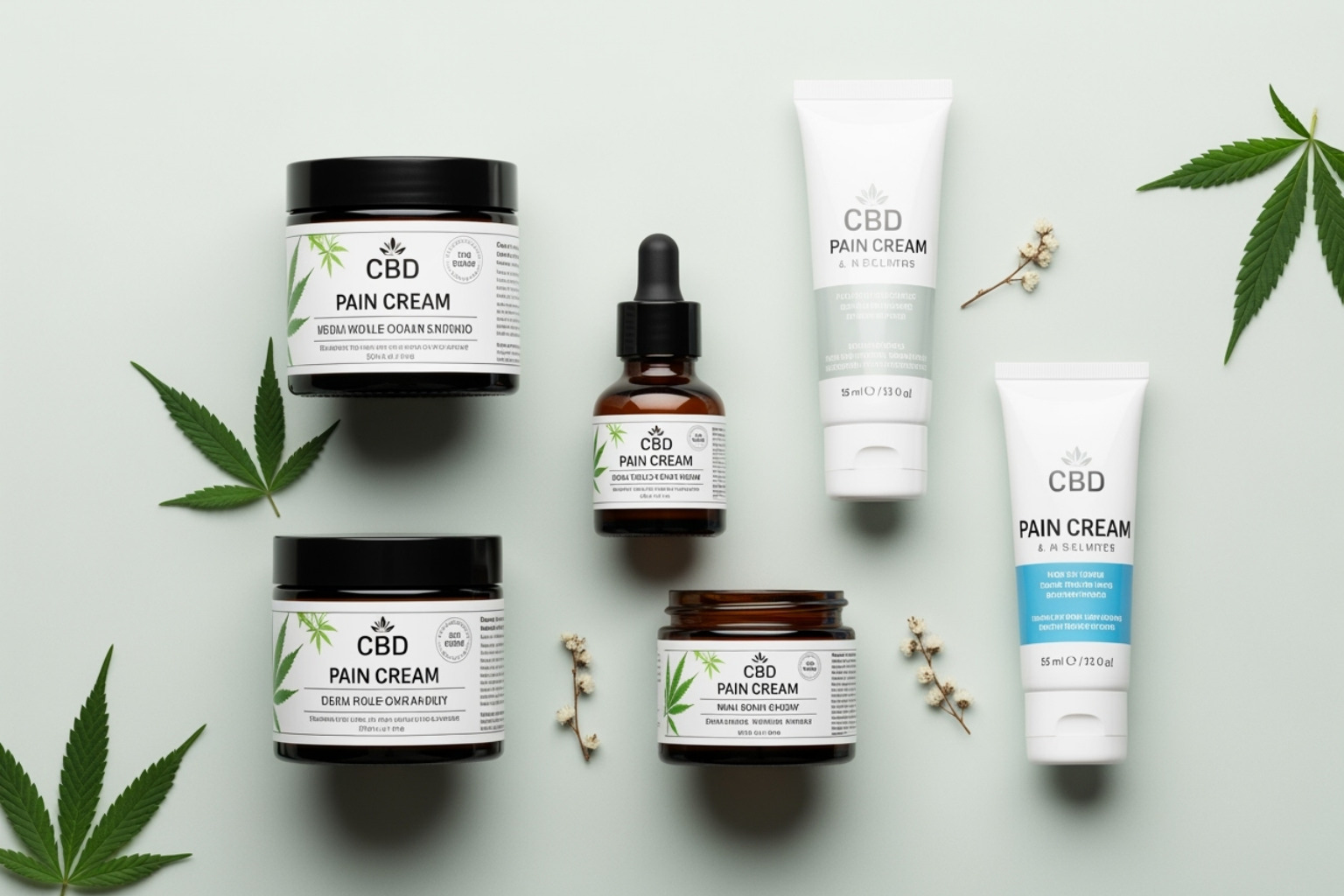Why CBD Pain Creams Are Gaining Attention for Fibromyalgia Relief
Best cbd pain creams for fibromyalgia are topical products combining cannabidiol (CBD) with other ingredients to potentially ease the widespread discomfort of this chronic condition. For quick reference, here are key factors to consider:
- Full-spectrum CBD creams offer multiple cannabinoids for a potential "entourage effect."
- THC-free options use CBD isolate for those who must avoid THC.
- High-potency formulas provide stronger concentrations for more severe pain.
- Third-party testing and Certificates of Analysis (COA) are essential for safety and quality.
- Cooling ingredients like menthol or arnica can provide additional, immediate relief.
Fibromyalgia affects millions in the US, causing chronic pain, fatigue, and sleep issues. When traditional treatments fall short, many explore natural alternatives like CBD.
CBD is a non-psychoactive compound from the cannabis plant that shows promise for pain management. Unlike THC, it won't cause a "high." It may help reduce inflammation and interact with the body's endocannabinoid system to ease pain perception.
While not a cure, CBD creams may help manage fibromyalgia symptoms. Research suggests cannabis-derived products can decrease pain, and since topical CBD acts locally to reduce inflammation without significant absorption into the bloodstream, it's ideal for targeting specific tender points.
I'm Tony Enrico. My work with Neuropasil in helping people manage nerve and muscle pain has shown me the need for effective relief. My experience in formulating topical pain relief gives me insight into what works for chronic conditions like fibromyalgia.

Understanding Fibromyalgia and the Potential of CBD
Living with fibromyalgia means enduring widespread musculoskeletal pain, often accompanied by severe fatigue, "fibro fog," and mood changes. The condition is challenging because it involves the central nervous system amplifying pain signals, a process known as central sensitization. This makes normal sensations feel painful. If you're curious about the science behind nerve pain, our article on The Root of the Problem: Decoding Nerve Pain offers a deeper exploration.
So, where does CBD fit in? Your body has an endocannabinoid system (ECS), which helps regulate pain, mood, and sleep. CBD interacts with this system indirectly, encouraging your body to use its own natural cannabinoids more effectively without causing a "high" like THC.
For fibromyalgia, CBD's potential benefits are multifaceted. Its anti-inflammatory properties are a key area of interest. Scientific research on CBD's anti-inflammatory effects suggests it may reduce inflammation, which can contribute to the aches and discomfort of fibromyalgia. When applied topically, CBD creams can help soothe these tender areas.
Beyond inflammation, CBD may also help with pain perception modulation. Surveys of fibromyalgia patients report that CBD helps them manage their pain, suggesting it may turn down the "volume" on amplified pain signals in the nervous system. This is especially relevant for the central sensitization aspect of fibromyalgia.
The condition also brings ancillary symptoms like poor sleep and anxiety. A 2019 study on CBD for sleep and anxiety found that daily CBD use improved both. Better sleep and reduced anxiety can significantly improve the quality of life for someone with chronic pain.
It's important to have realistic expectations. CBD pain creams are not a cure. They are one tool in a broader pain management plan, offering localized relief for tender points without the systemic effects of oral products. While more research is needed, CBD's potential to interact with the ECS, reduce inflammation, and help with sleep and anxiety makes it a compelling option to discuss with your doctor.
How to Choose a High-Quality CBD Cream
Choosing a safe, high-quality product is crucial when dealing with fibromyalgia. The CBD market is not as strictly regulated as pharmaceuticals, so consumers must be diligent when selecting a reliable cream.

Here's what to look for:
- Third-Party Lab Testing: This is non-negotiable. A reputable company will provide a Certificate of Analysis (COA) from an independent lab. The COA verifies CBD content, confirms THC levels are below 0.3%, and ensures the product is free of contaminants like pesticides and heavy metals. If a COA isn't easy to find, that's a major red flag.
- Hemp Sourcing: Hemp plants are "bio-accumulators00004-0)," meaning they absorb substances from the soil. Look for products made from US-grown, organic hemp to ensure purity and avoid contaminants.
- Potency and Concentration: CBD creams are sold in various strengths (mg of CBD per container). For fibromyalgia pain, a moderate to high potency (500-1000mg) is often a good starting point, but individual needs vary.
- Other Beneficial Ingredients: The most effective creams often combine CBD with other helpful ingredients. Look for additions like menthol for cooling, arnica for inflammation, and aloe vera for soothing the skin. These ingredients can provide immediate relief while the CBD works. Our Neuropasil formulas use a powerful combination of Aloe, Urea, and Menthol for fast-acting relief. Learn more in our article: Discover the Power of All-Natural Relief: How Aloe, Urea, and Menthol in Neuropasil's Topical Formula Soothe Nerve and Muscle Pain Fast.
- Company Reputation: Check customer reviews and ensure the company is transparent about its manufacturing processes. Avoid brands making miracle claims or those with FDA warning letters.
What are the different types of CBD?
The type of CBD affects its potential benefits.
- Full-spectrum CBD: Contains all compounds from the hemp plant, including trace amounts of THC (<0.3%). This can produce an "entourage effect" where the compounds work together to improve benefits.
- Broad-spectrum CBD: Contains various cannabinoids and terpenes but has all THC removed. It offers a partial entourage effect for those who must avoid THC.
- CBD Isolate: This is 99% pure CBD with no other plant compounds. It's ideal for those sensitive to other cannabinoids or who need to avoid THC completely.
| Type of CBD | THC Content | Other Cannabinoids & Terpenes | Entourage Effect | Best For |
|---|---|---|---|---|
| Full-Spectrum | < 0.3% | Yes | Yes | Maximum therapeutic benefit, general pain & inflammation |
| Broad-Spectrum | 0% | Yes | Partial | Avoiding THC, but still benefiting from other compounds |
| CBD Isolate | 0% | No | No | THC-sensitive individuals, specific CBD effects only |
Key Features to Look for in CBD Pain Creams for Fibromyalgia
Navigating the vast sea of CBD products can be overwhelming. After examining ingredients, quality standards, and user experiences, we've identified the key features that make certain CBD creams particularly effective for addressing the discomfort of fibromyalgia.

Full-Spectrum Formulas: Maximizing the Entourage Effect
For those seeking a comprehensive approach, full-spectrum CBD creams use the "entourage effect," where all hemp compounds work together synergistically. When evaluating full-spectrum options, look for products with USDA Organic certification to ensure purity. The addition of complementary ingredients like menthol can provide an immediate cooling sensation to soothe aching muscles.
A key consideration is that full-spectrum products contain trace amounts of THC (under 0.3%), which may be a concern for those who undergo drug testing. Also check for common allergens like soy in the ingredient list.
THC-Free Options: Peace of Mind with CBD Isolate
For individuals who must avoid THC entirely, CBD isolate products offer a worry-free solution. The most effective THC-free formulas combine pure CBD with proven pain-relief ingredients like arnica and menthol - a powerful trio for relief. Arnica is traditionally used for inflammation, while menthol delivers a cooling effect that can interrupt pain signals by activating specific sensory receptors in the skin.
Look for products with a light, non-greasy texture that absorbs quickly into the skin. The main trade-off with isolate products is that without the other cannabinoids, it may take longer to feel the effects compared to full-spectrum options.
High-Potency Formulations: For Severe Pain Management
When fibromyalgia pain is severe, a high-potency cream may be necessary. Look for products offering 1000mg concentration or higher for those needing a stronger response. The best high-potency options combine USDA Organic certification with full-spectrum formulas sourced from US-grown hemp.
Cooling formulations provide immediate comfort, while the high potency delivers a substantial dose of CBD to targeted areas. That premium quality and higher concentrations often come with a higher price point.
Alternative Natural Solutions
While CBD creams show promise, it's worth noting that other natural topical solutions can also provide effective relief for fibromyalgia pain. Products containing menthol, aloe vera, and urea - like those found in specialized nerve and muscle pain formulas - offer fast-acting relief without CBD. These alternatives can be particularly useful for those who cannot use CBD due to drug testing requirements or medication interactions.
Safe Application and Complementary Approaches
Managing fibromyalgia is about building a personalized toolkit of strategies, not finding a single magic bullet. CBD creams can be a valuable tool, but they work best as part of a broader wellness plan. For more guidance, see our article on Living Well with Chronic Pain: Your Guide to Comfort.
Crucially, always consult your doctor before trying any new treatment, including CBD creams. This is vital because CBD can interact with other medications.
How to Use CBD Creams
To use CBD creams effectively, follow these simple steps:
- Target the Pain: Apply the cream directly to tender points or areas with muscle and joint discomfort.
- Start Small: Begin with a pea-sized amount and perform a patch test on a small area of skin (like your inner forearm) to check for sensitivity.
- Avoid Broken Skin: Never apply creams to cuts, open wounds, or irritated skin.
- Be Consistent: For chronic conditions like fibromyalgia, regular application (e.g., 2-3 times daily, as per product instructions) often yields better results than sporadic use.
Topical CBD works locally and doesn't typically enter the bloodstream in significant amounts, making it ideal for targeted relief without systemic effects.
Potential Side Effects and Drug Interactions
Topical CBD is generally well-tolerated, with potential side effects being minor and localized, such as skin irritation or redness. A 2017 research review on CBD safety supports its strong safety profile.
The most significant concern is drug interactions. CBD can affect how your liver metabolizes certain medications, potentially altering their effectiveness. A review on CBD and medication interactions shows it can interfere with blood thinners, antidepressants, and other common drugs. This is why the FDA strongly advises checking with your doctor before using CBD, especially if you are on other medications.
Alternative and Complementary Treatments
A holistic approach is often most effective for fibromyalgia. Consider these complementary strategies recommended by health experts:
- Gentle Movement: Low-impact exercises like walking, swimming, or yoga can ease stiffness and boost mood.
- Acupuncture and Massage: These therapies can help reduce pain, relax tense muscles, and provide soothing relief.
- Mind-Body Practices: Meditation and cognitive behavioral therapy (CBT) can help you manage your perception of pain and reduce stress.
- Other Topical Relievers: Don't overlook non-CBD options. Creams with menthol, capsaicin, or arnica can be very effective. Our own Neuropasil creams are formulated with natural ingredients like menthol, aloe, and urea to deliver fast-acting relief for nerve and muscle pain, and many customers use them successfully for fibromyalgia. Explore your options in our guide to Topical Pain Relief Creams, Gels, and Ointments Explained.
Frequently Asked Questions
We're here to address the most common questions about using CBD creams for fibromyalgia.
Do CBD creams really work for fibromyalgia pain?
While research is still emerging, there is reason for optimism. Anecdotal evidence and early studies suggest CBD may help with fibromyalgia symptoms like localized pain, sleep issues, and anxiety. We know from scientific research on CBD's anti-inflammatory effects that it has anti-inflammatory properties.
Because topical CBD acts locally with minimal absorption into the bloodstream, it's best suited for targeting specific tender points rather than providing systemic relief. CBD creams are not a cure, but they can be a valuable tool for localized pain management. While more large-scale human studies on topical CBD are needed, preclinical studies show it can reduce localized inflammation and pain. Given that CBD is generally considered safe, it is a reasonable option to explore as part of a larger treatment plan.
Is it legal to buy and use CBD creams for fibromyalgia?
Yes, at the federal level. The 2018 Farm Bill made hemp-derived CBD products with less than 0.3% THC legal in the United States. However, state laws vary, with some being more restrictive. It's always wise to check your local regulations before purchasing or traveling with CBD products.
Can I use CBD cream with my other fibromyalgia medications?
This is a critical question. You must consult your doctor before using CBD if you take other medications. CBD can interact with how your body processes certain drugs, potentially making them more or less effective. Research shows CBD can affect medications like blood thinners and antidepressants. The FDA strongly advises checking with your doctor to ensure your safety. Your doctor can provide personalized advice based on your health history and current treatments.
Conclusion
Living with fibromyalgia is challenging, but you have options. CBD pain creams can be a promising addition to your pain management toolkit, offering targeted relief for tender points and sore muscles.
As we've covered, CBD may help by reducing inflammation and modulating pain signals. When choosing a product, prioritize quality by looking for third-party lab testing (COAs) and US-grown hemp. Understanding the difference between full-spectrum, broad-spectrum, and isolate CBD will help you select the right product for your needs.
CBD creams are most effective as part of a holistic approach that includes gentle exercise, stress management, and other therapies. Don't forget other topical relievers; our Neuropasil creams use menthol, aloe, and urea for fast-acting nerve and muscle pain relief, making them an excellent ally for fibromyalgia discomfort.
Most importantly, talk to your doctor before adding CBD to your routine to ensure it's safe and won't interact with your medications. Your journey to comfort is personal, and we're here to empower you with information. For a broader look at your options, read our guide on Topical Pain Relief Creams, Gels, and Ointments Explained. You deserve to find what works for you.
References
Throughout this article, we've drawn on a wealth of scientific research and authoritative sources to provide you with accurate, trustworthy information about CBD and fibromyalgia. We believe in transparency, and that means showing you exactly where our information comes from. Here's a complete list of the studies, reviews, and resources we've referenced:
Atug, O., et al. (2019). The effect of cannabidiol on sleep and anxiety in a clinical population. The Permanente Journal, 23, 18-041. Available at: https://www.ncbi.nlm.nih.gov/pmc/articles/PMC6326553/
Balachandran, P., et al. (2021). Cannabidiol interactions with medications, illicit substances, and alcohol: A comprehensive review. Journal of General Internal Medicine, 36(7), 2074–2084. Available at: https://pmc.ncbi.nlm.nih.gov/articles/PMC8298645/
Boehnke, K. F., et al. (2021). Cannabidiol use for fibromyalgia: Prevalence of use and perceptions of effectiveness in a large online survey. The Journal of Pain, 22(5), 556-566. Available at: https://www.jpain.org/article/S1526-5900(20)30117-6/fulltext
Centers for Disease Control and Prevention. (2020). Fibromyalgia. Available at: https://www.cdc.gov/arthritis/basics/fibromyalgia.htm
Hammell, D. C., et al. (2016). Transdermal cannabidiol reduces inflammation and pain-related behaviours in a rat model of arthritis. European Journal of Pain, 20(6), 936–948. Available at: https://www.ncbi.nlm.nih.gov/pmc/articles/PMC4851925/
Iffland, K., & Grotenhermen, F. (2017). An update on safety and side effects of cannabidiol: A review of clinical data and relevant animal studies. Cannabis and Cannabinoid Research, 2(1), 139–154. Available at: https://www.ncbi.nlm.nih.gov/pmc/articles/PMC5569602/
Linger, P., et al. (2002). Industrial hemp (Cannabis sativa L.) growing on heavy metal contaminated soil: fibre quality and phytoremediation potential. Industrial Crops and Products, 16(1), 33-42. Available at: https://doi.org/10.1016/s0926-6690(02)00004-0
Mayo Clinic. (2023). Fibromyalgia: Diagnosis & treatment. Available at: https://www.mayoclinic.org/diseases-conditions/fibromyalgia/diagnosis-treatment/drc-20354783
McKemy, D. D., et al. (2002). Identification of a cold receptor reveals a general role for TRP channels in thermosensation. Nature, 416(6876), 52-58. Available at: https://www.nature.com/articles/nature726
National Center for Complementary and Integrative Health. (2020). Arnica. Available at: https://www.nccih.nih.gov/health/arnica
National Conference of State Legislatures. (2024). State Medical Cannabis Laws. Available at: https://www.ncsl.org/health/state-medical-cannabis-laws
Pellicciari, R., et al. (2020). The anti-inflammatory properties of cannabidiol. Journal of Experimental Medicine, 217(1). Available at: https://www.ncbi.nlm.nih.gov/pmc/articles/PMC7023045/
Russo, E. B. (2011). Taming THC: potential cannabis synergy and phytocannabinoid-terpenoid entourage effects. British Journal of Pharmacology, 163(7), 1344–1364. Available at: https://www.ncbi.nlm.nih.gov/pmc/articles/PMC3165946/
Sagy, I., et al. (2019). Safety and efficacy of medical cannabis in fibromyalgia. Journal of Clinical Medicine, 8(6), 807. Available at: https://www.ncbi.nlm.nih.gov/pmc/articles/PMC6616435/
U.S. Department of Agriculture. (n.d.). Hemp and the 2018 Farm Bill. Available at: https://www.farmers.gov/manage/hemp
U.S. Food and Drug Administration. (2022). What You Should Know About Using Cannabis, Including CBD, When Pregnant or Breastfeeding. Available at: https://www.fda.gov/consumers/consumer-updates/what-you-should-know-about-using-cannabis-including-cbd-when-pregnant-or-breastfeeding
U.S. Food and Drug Administration. (2023). Regulation of Cannabis and Cannabis-Derived Products, Including Cannabidiol (CBD). Available at: https://www.fda.gov/news-events/public-health-focus/fda-regulation-cannabis-and-cannabis-derived-products-including-cannabidiol-cbd
Woolf, C. J. (2011). Central sensitization: implications for the diagnosis and treatment of pain. Pain, 152(3 Suppl), S2–S15. Available at: https://www.ncbi.nlm.nih.gov/pmc/articles/PMC3268359/
We're committed to staying current with the latest research on CBD and pain management. As new studies emerge, we'll continue to update our content to ensure you have access to the most reliable, up-to-date information for making informed decisions about your fibromyalgia care.














